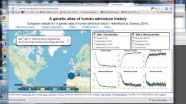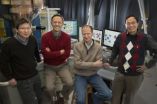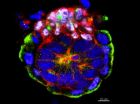(Press-News.org) This news release is available in German.
When individuals from different groups interbreed, their offspring's DNA becomes a mixture of the DNA from each admixing group. Pieces of this DNA are then passed along through subsequent generations, carrying on all the way to the present day. Researchers from the Max Planck Institute for Evolutionary Anthropology in Leipzig, Germany, Oxford University and University College London (UCL) have now produced a global map detailing the genetic histories of 95 different populations across the world, spanning the last four millennia.
The interactive world map, that is accessible via the internet, details the histories of genetic mixing between each of the 95 populations across Europe, Africa, Asia and South America. It shows likely genetic impacts of historical events including European colonialism, the Mongol Empire, the Arab slave trade and European traders near the Silk Road mixing with people in China.
The study, published this week in Science, is the first to simultaneously identify, date and characterise genetic mixing between populations. To do this, the researchers developed sophisticated statistical methods to analyse the DNA of 1490 individuals in 95 populations around the world. "DNA really has the power to tell stories and uncover details of humanity's past", said Simon Myers of Oxford University's Department of Statistics and Wellcome Trust Centre for Human Genetics, co-senior author of the study. "Because our approach uses only genetic data, it provides information independent from other sources. Many of our genetic observations match historical events, and we also see evidence of previously unrecorded genetic mixing. For example, the DNA of the Tu people in modern China suggests that in around 1200CE, Europeans similar to modern Greeks mixed with an otherwise Chinese-like population. Plausibly, the source of this European-like DNA might be merchants travelling the nearby Silk Road."
The powerful technique, christened 'Globetrotter', provides insight into past events such as the genetic legacy of the Mongol Empire. Historical records suggest that the Hazara people of Pakistan are partially descended from Mongol warriors, and this study found clear evidence of Mongol DNA entering the population during the period of the Mongol Empire. Six other populations, from as far west as Turkey, showed similar evidence of genetic mixing with Mongols around the same time.
"What amazes me most is simply how well our technique works", said Garrett Hellenthal of the UCL Genetics Institute, lead author of the study. "Although individual mutations carry only weak signals about where a person is from, by adding information across the whole genome we can reconstruct these mixing events. Sometimes individuals sampled from nearby regions can have surprisingly different sources of mixing. For example, we identify distinct events happening at different times among groups other than the Hazara sampled within Pakistan, with some inheriting DNA from sub-Saharan Africa, perhaps related to the Arab Slave Trade, another from East Asia, and yet another from ancient Europe. Nearly all our populations show mixing events, so they are very common throughout recent history and often involve people migrating over large distances."
The team used genome data for all 1490 individuals to identify 'chunks' of DNA that were shared between individuals from different populations. Populations sharing more ancestry share more chunks, and individual chunks give clues about the underlying ancestry along chromosomes.
"Each population has a particular genetic 'palette'", said Daniel Falush of the Max Planck Institute for Evolutionary Anthropology in Leipzig, Germany, co-senior author of the study. "If you were to paint the genomes of people in modern-day Maya, for example, you would use a mixed palette with colours from Spanish-like, West African and Native American DNA. This mix dates back to around 1670AD, consistent with historical accounts describing Spanish and West African people entering the Americas around that time. Though we can't directly sample DNA from the groups that mixed in the past, we can capture much of the DNA of these original groups as persisting, within a mixed palette of modern-day groups."
As well as providing fresh insights into historical events, the new research might have implications for how DNA impacts health and disease in different populations.
INFORMATION:
Original publication:
Garrett Hellenthal, George B.J. Busby, Gavin Band, James F. Wilson, Cristian Capelli, Daniel Falush, Simon Myers
A Genetic Atlas of Human Admixture History
Science, 14 February 2014
Mixed genes
An interactive world map of human genetic history reveals likely genetic impacts of historical events
2014-02-14
ELSE PRESS RELEASES FROM THIS DATE:
Study highlights indigenous response to natural disaster
2014-02-14
DENVER (Feb. 13, 2014) – When a tsunami struck American Samoa in 2009, indigenous institutions on the islands provided effective disaster relief that could help federal emergency managers in similar communities nationwide, according to a study from the University of Colorado Denver and the University of Hawaii at Manoa.
The study found that following the tsunami, residents of the remote U.S. territory in the South Pacific relied on Fa'aSamoa or The Samoan Way, an umbrella term incorporating a variety of traditional institutions governing the lives of its citizens.
"We ...
Berkeley Lab researchers at AAAS 2014
2014-02-14
Can more accurate climate models help us understand extreme weather events? Can we use
synthetic biology to create better biofuels? These questions, and the ongoing search for Dark
Matter and better photovoltaic materials, are just some of the presentations by Lawrence
Berkeley National Lab researchers at this year's AAAS meeting. Here's a quick look at Berkeley
Lab@AAAS:
Friday, Feb. 14
1:00-2:30
Opportunities for New Materials in
Photovoltaics (Toronto Room, Hyatt Regency)
Ramamoorthy Ramesh
The
Department of Energy's ...
Superconductivity in orbit: Scientists find new path to loss-free electricity
2014-02-14
UPTON, NY—Armed with just the right atomic arrangements, superconductors allow electricity to flow without loss and radically enhance energy generation, delivery, and storage. Scientists tweak these superconductor recipes by swapping out elements or manipulating the valence electrons in an atom's outermost orbital shell to strike the perfect conductive balance. Most high-temperature superconductors contain atoms with only one orbital impacting performance—but what about mixing those elements with more complex configurations?
Now, researchers at the U.S. Department of ...
Rewriting the text books: Scientists crack open 'black box' of development
2014-02-14
We know much about how embryos develop, but one key stage – implantation – has remained a
mystery. Now, scientists from Cambridge have discovered a way to study and film this 'black box'
of development. Their results – which will lead to the rewriting of biology text books worldwide
– are published in the journal Cell. Embryo development in mammals occurs in two phases.
During the first phase, pre-implantation, the embryo is a small, free-floating ball of cells
called a blastocyst. In the second, post-implantation, phase the blastocyst embeds itself in the
mother's ...
A role of glucose tolerance could make the adaptor protein p66Shc a new target for cancer and diabetes
2014-02-14
[TORONTO,Canada, Feb 18, 2014] – A protein that has been known until recently as part of a complex communications network within the cell also plays a direct role in regulating sugar metabolism, according to a new study published on-line in the journal Science Signaling (February 18, 2014).
Cell growth and metabolism are tightly controlled processes in our cells. When these functions are disturbed, diseases such as cancer and diabetes occur. Mohamed Soliman, a PhD candidate at the Lunenfeld Tanenbaum Research Institute at Mount Sinai Hospital, found a unique role for ...
IBEX research shows influence of galactic magnetic field extends beyond our solar system
2014-02-14
In a report published today, new research suggests the enigmatic "ribbon" of energetic
particles discovered at the edge of our solar system by NASA's Interstellar Boundary Explorer (IBEX)
may be only a small sign of the vast influence of the galactic magnetic field.
IBEX researchers have sought answers about the ribbon since its discovery in 2009. Comprising
primarily space physicists, the IBEX team realized that the galactic magnetic field wrapped around
our heliosphere — the giant "bubble" that envelops and protects our solar system — appears to
determine the orientation ...
Rebuilding the brain after stroke
2014-02-14
DETROIT – Enhancing the brain's inherent ability to rebuild itself after a stroke with molecular
components of stem cells holds enormous promise for treating the leading cause of long-term
disability in adults.
Michael Chopp, Ph.D., Scientific Director of the Henry Ford Neuroscience Institute, will present
this approach to treating neurological diseases Thursday, Feb. 13, at the American Heart
Association's International Stroke Conference in San Diego.
Although most stroke victims recover some ability to voluntarily use their hands and other body
parts, half are ...
Amidst bitter cold and rising energy costs, new concerns about energy insecurity
2014-02-14
February 13,2014 --With many regions of the country braced by an unrelenting cold snap, the problem of energy insecurity continues to go unreported despite its toll on the most vulnerable. In a new brief, researchers at Columbia University's Mailman School of Public Health paint a picture of the families most impacted by this problem and suggest recommendations to alleviate its chokehold on millions of struggling Americans. The authors note that government programs to address energy insecurity are coming up short, despite rising energy costs.
Energy Insecurity (EI) is ...
Harvard scientists find cell fate switch that decides liver, or pancreas?
2014-02-14
Harvard stem cell scientists have a new theory for how stem cells decide whether to become
liver or pancreatic cells during development. A cell's fate, the researchers found, is determined by
the nearby presence of prostaglandin E2, a messenger molecule best known for its role in
inflammation and pain. The discovery, published in the journal Developmental Cell, could potentially
make liver and pancreas cells easier to generate both in the lab and for future cell therapies.
Wolfram Goessling, MD, PhD, and Trista North, PhD, both principal faculty members of the
Harvard ...
Arctic biodiversity under serious threat from climate change according to new report
2014-02-14
Unique and irreplaceable Arctic wildlife and landscapes are crucially at risk due to global warming caused by human activities according to the Arctic Biodiversity Assessment (ABA), a new report prepared by 253 scientists from 15 countries under the auspices of the Conservation of Arctic Flora and Fauna (CAFF), the biodiversity working group of the Arctic Council.
"An entire bio-climatic zone, the high Arctic, may disappear. Polar bears and the other highly adapted organisms cannot move further north, so they may go extinct. We risk losing several species forever," says ...
LAST 30 PRESS RELEASES:
Fecal transplants from older mice significantly improve ovarian function and fertility in younger mice
Delight for diastereomer production: A novel strategy for organic chemistry
Permafrost is key to carbon storage. That makes northern wildfires even more dangerous
Hairdressers could be a secret weapon in tackling climate change, new research finds
Genetic risk for mental illness is far less disorder-specific than clinicians have assumed, massive Swedish study reveals
A therapeutic target that would curb the spread of coronaviruses has been identified
Modern twist on wildfire management methods found also to have a bonus feature that protects water supplies
AI enables defect-aware prediction of metal 3D-printed part quality
Miniscule fossil discovery reveals fresh clues into the evolution of the earliest-known relative of all primates
World Water Day 2026: Applied Microbiology International to hold Gender Equality and Water webinar
The unprecedented transformation in energy: The Third Energy Revolution toward carbon neutrality
Building on the far side: AI analysis suggests sturdier foundation for future lunar bases
Far-field superresolution imaging via k-space superoscillation
10 Years, 70% shift: Wastewater upgrades quietly transform river microbiomes
Why does chronic back pain make everyday sounds feel harsher? Brain imaging study points to a treatable cause
Video messaging effectiveness depends on quality of streaming experience, research shows
Introducing the “bloom” cycle, or why plants are not stupid
The Lancet Oncology: Breast cancer remains the most common cancer among women worldwide, with annual cases expected to reach over 3.5 million by 2050
Improve education and transitional support for autistic people to prevent death by suicide, say experts
GLP-1 drugs like Ozempic could cut risk of major heart complications after heart attack, study finds
Study finds Earth may have twice as many vertebrate species as previously thought
NYU Langone orthopedic surgeons present latest clinical findings and research at AAOS 2026
New journal highlights how artificial intelligence can help solve global environmental crises
Study identifies three diverging global AI pathways shaping the future of technology and governance
Machine learning advances non targeted detection of environmental pollutants
ACP advises all adults 75 or older get a protein subunit RSV vaccine
New study finds earliest evidence of big land predators hunting plant-eaters
Newer groundwater associated with higher risk of Parkinson’s disease
New study identifies growth hormone receptor as possible target to improve lung cancer treatment
Routine helps children adjust to school, but harsh parenting may undo benefits
[Press-News.org] Mixed genesAn interactive world map of human genetic history reveals likely genetic impacts of historical events





